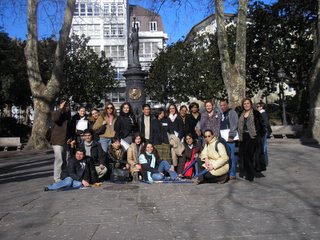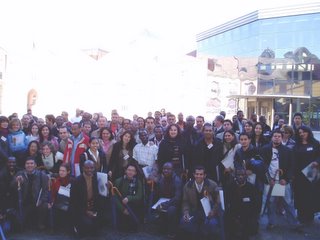first suggestion of spring
Yesterday was a good day, and was unique. It was sunny; not the first sunny day of the winter, but yesterday was unique in that it suggested the Spring season to come. How so? The acoustics of the day was different; the acoustics of the city were different. And today we´ve been lucky, in that it is yet another beautiful day. Thank goodness. I´ve had two winters in less than a year (one in the southern hemisphere, and one in the northern hemisphere). So, imagine that I am quite ready to feel/sense/experience Summer.
That´s all for now :)
how to not be competitive
For the past week Cape Town (the city and outlying suburbs) has been continuously subject to power failures, for hours on end. Imagine the impact on life, business, teaching, just about everything. The worst I am told, and am led to understand, is the lack of information on when the situation will be remedied. See the articles:
Light at the end of the tunnel , and
Power cuts cripple hospitals, industry . The notion of being a competitive nation, or in this case region, surfaces, hence the title of this blog. And after all, what´s bad about the event is not the event in and of itself, but eventually the tardy official and seemingly technical response.
This brings me to another point. In Spanish the word ´mampara´ designates something as mild and unexciting as the notion of a screen. In South Africa, a mampara is a fool of the worst degree. For instance, each week in a Sunday paper, a columnist awards the "mampara of the week" award to a someone (a public figure usually) who has said or done the absolute stupidest thing that week. (Something along the lines of the onion award that may be familiar to you.) So who deserves the epithet mampara in the blackouts across the Cape Peninsula?
data protection cont´d (+ an aside)
A favorite pic of Cape Town:
http://www.fotopaises.com/foto/Sudafrica/Cape_Town/6356.htmNice vista of the whole peninsula, with the Atlantic Ocean in the foreground, and the Indian Ocean in the background.
-----------
Thinking further on data protection legislation in South Africa analogous to the Spanish example, and our lack of extensive such legislation. I had some notions around the latter relating to the number of persons in South Africa who are online, or supposedly make use of the official/formal banking infrastructure (about 4 million of the population of approx. 45 million), which now seem far off the mark and not worth elaborating :)
Herewith an excerpt from bridges.org´s response to the Parliamentary Portfolio Committee re the then (2002) ECT Bill, and in particular regarding data protection:
Source
http://www.bridges.org/e-policy/sa/ect/Chapter VIII: Protection of Personal InformationWe commend the provisions set out in this Chapter aimed at protecting personal information. However, subscription to the principle should be mandatory, not voluntary, and there may be a need to include additional principles at a later date. Provision should be made for this in the legislation, especially in view of the fact that the Law Commission is currently developing specific data protection/privacy legislation and this is expected to be enacted within 24 months. We believe that this legislation should also be fast-tracked so that it can keep pace with the provisions of this Bill. We also suggest that Section 52(3) be amended to state that data controllers must not only disclose the purpose for which any personal information is being "requested…or stored", but must also provide the information itself to the data subject if requested to do so in writing.-----Worth looking at is the South African Law Reform Commission´s issue papers (
http://www.law.wits.ac.za/salc/issue/issue.html), number 124 in particular deals with data protection. I link here to the Summary of Proposals and Questionnaire:
http://www.law.wits.ac.za/salc/issue/ip24-sum-ques.pdfNote that the date for comments is late-2003.
I see no related draft legislation online, not here
http://www.polity.org.za/pol/draftbill/, neither here
http://www.polity.org.za/pol/bill/
data protection vs. access to information
As I may have mentioned some weeks ago, we have had lessons on data protection, and the Spanish legislation is quite extensive in this regard, with a particular emphasis on the user/citizen having the right to be informed of the intended use(s) of his/her information, and having the right to access, modify, or cancel his/her record in a database. The overt emphasis then is the licit gathering and use of data of a personal character, and that the end-user/client is always aware and has expressly consented to the data being stored in a database. Turning to the South African scenario, we do not have extensive data protection legislation analogous to the Spanish example. For one, we have some protection outlined in the Electronic Communications and Transactions Act (2002) http://www.acts.co.za/ect_act/(articles 42 to 51) regarding Consumer protection for transactions in the electronic environment and the protection of personal information, with a greater emphasis on access to information held by public and private entities as detailed in the PROATIA (Promotion of Access to Information Act 2000) http://www.acts.co.za/prom_of_access_to_info/index.htm
The emphasis in South Africa is access to information as a human right, so as to promote democracy and greater transparency in society (and of the government). The latter is also signalled by the mere act of the responsible person for overseeing the implementation of the PROATIA law being based at the Human Rights Commission in South Africa (www.sahrc.org.za/). The Spanish emphasis seems oriented more to the citizen having a right and appropriate recourse to not being exploited in the use of his/her personal information. And so a special agency (the Spanish Data Protection Agency (Agencia Española de Protección de Datos https://www.agpd.es/)) has been established to achieve this end. It is interesting to note the difference in the raison d´être in this regard between the two countries. Of course they are (1) based in entirely different legal systems; (2) Spain being part of the EU, the law in this regard is spearheaded by supra-national legislation. And yet, the question is why even now, does South Africa not have specific and extensive data protection legislation?


Between 8 and 12 Feb I was in Galicia, in the north-west of Spain, to attend a get-together of some of the students on a bursary from the Spanish development agency (AECI).
See photos on
www.jenniferdebeer.net/photoalbum.html as well as links there to other photos from fellow attendees.
I include above the Madrid group foto, as well as the official group photo (though a fair number of persons (if not all?) from the Madrid group are not featured in the official group photo (we had left early with our tour guide so as to explore the city of A Coruña)).
A discussion list has also been created, see
http://es.groups.yahoo.com/group/encuentrobecarios-aeci/PS: There had been three busses ferrying the students from three points of origin: one originating in Madrid, one from Barcelona, and the third from Granada. All in all 150 students were present, representing 75 countries.
infrastructure and urbanization

Today we have a lecture with Agustín E. de Asís Roig (). What a plesant surprise, since we haven´t received the programme for Feb yet, and so had no forewarning. I like the theme that he´s dealing with, the intersection of technological infrastructure and urban development. What a coincidence, in that it was just this last Saturday that I bought the book Mutations
http://www.actar.es/castellano/003a.html, re Rem Koolhaas and the Harvard Project on the City
http://www.gsd.harvard.edu/people/faculty/koolhaas/research.htmlI am also thinking a lot about these things of late: about why (still) geographical displacement should necessarily mean professional displacement, in spite of all the theories about digital village, and of how we telecommute, etc. Okay, we know what the theory says. And yet, why is it when people contact me to ask about involvement in a project, and I happen to mention that I am in Spain, I get a response of "Okay, we´ll talk when you get back in October"? C´mon! These are folks who are active in tech. I don´t get it. Very frustrating. As you can tell :)
So, is Castells (and what Asís de Roig) are talking about, and what I firmly believe, just BS? Or is it that only a select few "inhabit" this no-place-space?
PS: The photo is of me in a cybercafe in Oxford Street, London, over Xmas.







